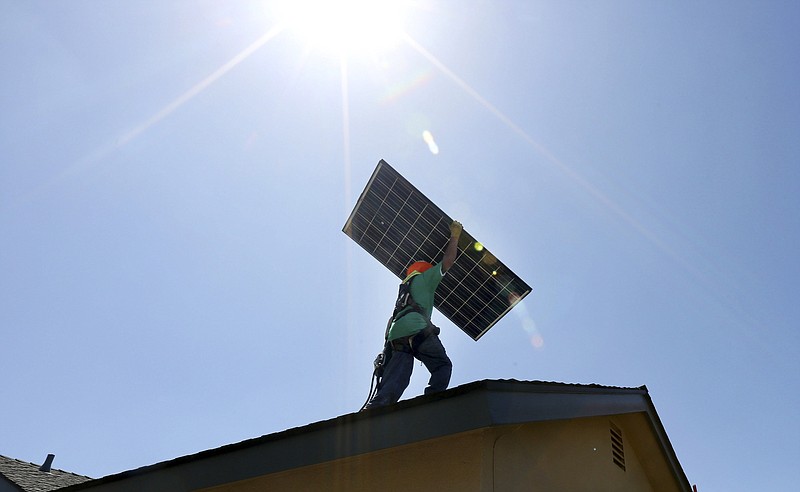The South is on a new energy trajectory. And it's a good one - for a change.
That's why, in an all-too-partisan age when Republican-led states rush to trash anything stamped by our president, we aren't seeing Tennessee jumping on the bandwagon to join a spate of lawsuits challenging Barack Obama's new Clean Power Plan and the EPA's resulting new carbon rules.
The truth is the Clean Power Plan benefits Tennessee, Georgia, Alabama and North Carolina. And even TVA says it won't be a drain on the massive utility that generates electricity in our region of seven southern states.
Of course that hasn't stopped the partisan whining. In fact, all but two of the 24 states filing U.S. Court of Appeals challenges are led by Republicans who deride the plan as an "unlawful power grab by Washington bureaucrats" that will kill coal mining jobs and drive up electricity costs.
Kill coal mining jobs? That would funny were it not so false.
For the past two decades, all of America has boasted fewer than 100,000 coal jobs. In fact, since 1958, the number of coal jobs only broke 250,000 once - often dropping much lower, according to charts from the Bureau of Labor Statistics. (Apparently, many of those jobs belong to lobbyists who ply Republican politicians with persuasion money.)
If we really want to talk jobs, look to clean energy numbers: Last year, the solar industry created jobs nearly 20 times faster than the overall U.S. economy. There are, in fact, already more solar jobs in America than coal mining jobs, and the forecasted growth of solar jobs in the coming year is eight times greater than oil, gas and coal combined.
And here's a bonus: Since 2005, carbon dioxide levels from electric power have dropped 29 percent in the Southeast. Why? Clean Air lawsuits from the other side forced the closure or retrofits of ancient coal power plants.
Ten years ago, there were 246 coal-fired units generating electric power in our region. Today, 126 of the existing units - a third of the total coal capacity in six southern states - are slated for retirement around 2020 and most of them are already closed, according to the Southern Environmental Law Center, one of primary groups that advocated for change.
Georgia has become one of the fastest growing solar markets in the country, and Tennessee has already cut 32 percent of its needed 39 percent reduction of carbon dioxide emissions by 2030. Further, TVA officials say the utility is on pace to cut carbon emissions by 40 percent by 2020.
TVA President Bill Johnson said TVA is well on its way thanks to new natural gas power plants, a second reactor at the Watts Bar Nuclear Plant and (drum roll, please) plans to expand hydroelectric, solar and existing nuclear power plants over the next decade. TVA shut down the Widows Creek Fossil Plant in Alabama last month and plans to shutter other coal units at its Colbert, Johnsonville, Paradise and Allen fossil plants.
Reasonable people (even some Republicans) understand and applaud this progress. Despite complaints from some of Tennessee's GOP lawmakers opposed to the new EPA rules, Gov. Bill Haslam and Tennessee Attorney General Herbert Slatery opted not to join in the headline-grabbing legal challenge to the new carbon restrictions.
But Slatery's decision upset many of the 59 legislators who signed a letter in August asking him to join the lawsuit against EPA.
State Sen. Janice Bowling, R-Tullahoma, who authored the letter, said she was "very disappointed" that Tennessee "is not doing the right thing" by challenging what she calls "junk science."
State Sen. Mike Bell, R-Riceville, called the EPA rules "an overreach of the federal government" and urged Slatery to reconsider and join the fight against the new rules to avoid higher power rates for businesses and consumers. Coal lobbyists had said the rules would raise Tennessee power rates 10 to 15 percent a year.
Higher power rates? Yes - but nowhere near that much. TVA directors in August raised rates by 1.5 percent, about $1.50 more a month for the average household in the Tennessee Valley in the coming year, but read on:
The rate increase will raise an extra $200 million to counter TVA's lowered $10.7 billion operating and spending budget. According to TVA's Johnson, it will still allow the utility to "reduce its debt" more than $6 billion over eight years, as well as comply with the new Clean Power Plan requirements. Much of TVA's debt, by the way, is for nuclear overruns in the past decade. And more than $1 billion was spent to clean up the Kingston coal ash spill of 2008.
So, kudos to Haslam and Slatery for not continuing the GOP war on truth. And long live the South's new energy trend - the one in which future investments in total solar capacity are on track to more than triple. Think jobs, lawmakers. Clean energy jobs.
